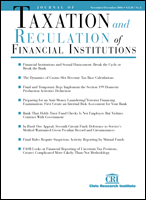Complete Issue
Author: Houman B. Shadab.
Source: Volume 28, Number 03, January/February 2015 , pp.1-64(64)

< previous article |return to table of contents
Abstract:
In our first article, Andrew Patty II examines on the widespread problem of data breaches in the context of credit card issuers seeking recovery for losses. Mr. Patty provides a helpful overview of the chain of custody for financial account data used in credit card processing, summarizes the law and regulation applicable to financial institutions involved in payment processing, and outlines several recent large-scale breaches and their ongoing impact. He then analyzes the types of claims asserted by card issuers against merchants and other participants in the chain of custody for recovery of losses arising out of massive data breaches. Alan I. Appel, in our second article, examines the controversial topic of corporate tax inversions. Mr. Appel reviews the tax benefits of inversions and illustrates their basic structures. Given that private equity firms and hedge funds benefit from holding positions in companies that engage in inversions, Mr. Appel’s discussion of this issue and proposed Internal Revenue Service reforms is relevant to the financial community. Our third article shines a spotlight on the growing problem of elder abuse. As Kevin L. Petrasic, Gerald S. Sachs, and Amanda M. Kowalski explain, various federal and state regulatory agencies are placing the burden on financial institutions to help reduce elder abuse, and thereby creating a new compliance challenge—and thus new operational and risk management concerns—for affected firms. The authors outline critical steps financial institutions should take to ensure compliance. Next up, John Redding, Kirk Jensen, Jessica Pollet, and Sasha Leonhardt discuss enforcement actions against debt collectors, which have increased substantially in recent years. The authors set out important lessons learned that apply to all those engaged in debt collection, drawn from actions taken by several federal agencies, including the Consumer Financial Protection Bureau and the Office of the Comptroller of the Currency, that are largely based on actionable unfair, deceptive, and abusive acts and practices. In the following article, Danilo P. Castelli reviews the controversy over whether the fiduciary standards long applicable to investment advisers under the Investment Advisers Act of 1940 should also extend to broker-dealers that often play an advisory role. Mr. Castelli reviews the regulatory framework and the contrasting recommendations made by the Securities and Exchange Commission (SEC) and the Securities Industry and Financial Markets Association. The SEC will likely decide on the issue in 2015. Thomas M. Schehr and Jared D. Kemper round out this issue with an assessment of ongoing litigation trends under the Home Affordable Modification Program (HAMP), which was created in 2009 to provide relief to residential mortgage borrowers. With extensions, HAMP will continue through the end of 2015, and related litigation can be expected beyond that point.Keywords: data breach; cyber security; card issuer; payment card records; data custodian; IRS Notice 2014-52; corporate inversions; proposed anti-inversion rules; Office of Older Americans; CFPB enforcement jurisdiction; FIN-2011-A003; Service members Civil Re
Affiliations:
1: New York Law School.